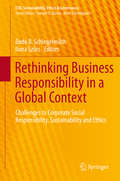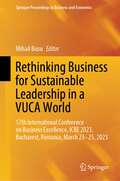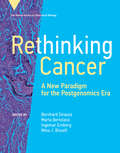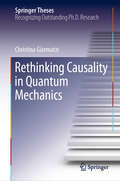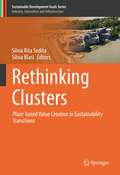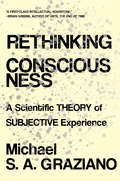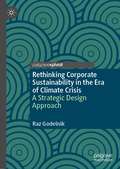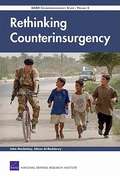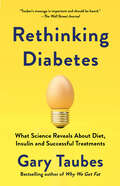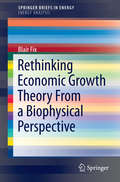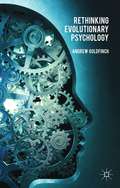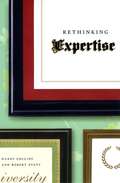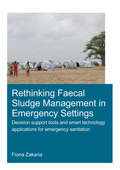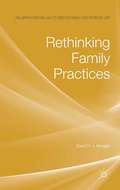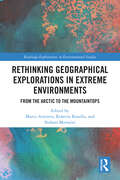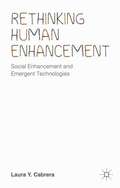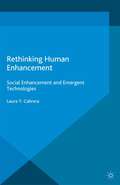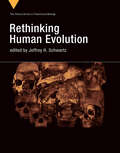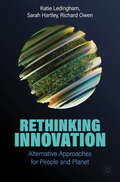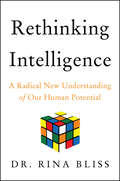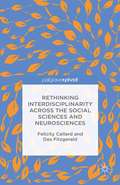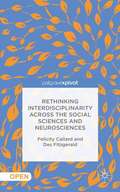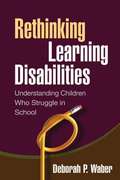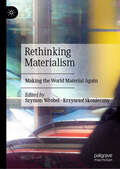- Table View
- List View
Rethinking Business Responsibility in a Global Context: Challenges to Corporate Social Responsibility, Sustainability and Ethics (CSR, Sustainability, Ethics & Governance)
by Bodo B. Schlegelmilch Ilona SzőcsThis book examines topical issues in global corporate social responsibility (CSR) from both scholarly and practical perspectives. It offers a variety of viewpoints and cases from countries around the globe and combines them with current academic knowledge. Intended for students, academics, and managers wishing to keep abreast of the challenges and opportunities for corporations operating in our ever-more-complex globalized world, this book provides fresh insights into responsible business conduct.
Rethinking Business for Sustainable Leadership in a VUCA World: 17th International Conference on Business Excellence, ICBE 2023, Bucharest, Romania, March 23-25, 2023 (Springer Proceedings in Business and Economics)
by Mihail BusuThis book presents a selection of the best papers from the 17th International Conference on Business Excellence, “Rethinking Business: Sustainable Leadership in a VUCA World” (ICBE 2023), held in Bucharest, Romania, in March 2023.In today's rapidly evolving landscape, characterized by volatility, uncertainty, complexity, and ambiguity (VUCA), the need to reshape business practices has become paramount. The book showcases research findings and perspectives on the new challenges particularly posed by the digital economy and research systems. Focusing on revolving business and developing sustainable leadership, it offers valuable insights into the present context of global crisis, together with solutions for the real-world challenges we face today.
Rethinking Cancer: A New Paradigm for the Postgenomics Era (Vienna Series in Theoretical Biology)
by Bernhard Strauss, Marta Bertolaso, Ingemar Ernberg, and Mina J. Bissell et al.Leading scientists argue for a new paradigm for cancer research, proposing a complex systems view of cancer supported by empirical evidence.Current consensus in cancer research explains cancer as a disease caused by specific mutations in certain genes. After dramatic advances in genome sequencing, never before have we known so much about the individual cancer cell--and yet never before has it been so unclear what to do with this knowledge. In this volume, leading researchers argue for a new theory framework for understanding and treating cancer. The contributors propose a complex systems view of cancer, presenting conceptual building blocks for a new research paradigm supported by empirical evidence.The contributors first discuss the new research framework in terms of theoretical foundations and then take up the relevance of a systems approach, reviewing such topics as nonlinearity, recurrence after treatment, the cellular attractor concept, network theory, and non-coding DNA--the "dark matter" of our genome. They address the temporality of cancer progression, drawing on evolutionary theory and clinical experience. Finally, they cover the dominant role of the tissue microenvironment in cancer, analyzing topics including altered metabolic pathways, the disease-defining influence on metastasis, and the interconnectedness of different environmental niches across levels of organization.
Rethinking Causality in Quantum Mechanics (Springer Theses)
by Christina GiarmatziCausality is central to understanding the mechanisms of nature: some event "A" is the cause of another event “B”. Surprisingly, causality does not follow this simple rule in quantum physics: due to to quantum superposition we might be led to believe that "A causes B” and that "B causes A”. This idea is not only important to the foundations of physics but also leads to practical advantages: a quantum circuit with such indefinite causality performs computationally better than one with definite causality. This thesis provides one of the first comprehensive introductions to quantum causality, and presents a number of advances. It provides an extension and generalization of a framework that enables us to study causality within quantum mechanics, thereby setting the stage for the rest of the work. This comprises: mathematical tools to define causality in terms of probabilities; computational tools to prove indefinite causality in an experiment; means to experimentally test particular causal structures; and finally an algorithm that detects the exact causal structure in an quantum experiment.
Rethinking Clusters: Place-based Value Creation in Sustainability Transitions (Sustainable Development Goals Series)
by Silvia Rita Sedita Silvia BlasiThis volume discusses how different geographical spaces can enhance or hinder the capacity of a variety of organizational settings to achieve economic value creation in the pursuit of sustainable regional development. In order to provide the most comprehensive picture of new sources of value creation for sustainable transitions, the book collects contributions that tackle this issue from a variety of perspectives, and adopts a systemic approach where macro, meso and micro-levels of analysis are intertwined in three sections. This multidisciplinary and interdisciplinary approach comes from scholars operating in the fields of planning, economic geography, social entrepreneurship and organizational management. The first section of the book adopts a macro-level approach linking sustainability to the regional development theme, and addresses how organizations work between different social interests to produce outcomes not previously realized. The second section of the book focuses on the spatial dimensions of sustainable development, with particular clusters, industrial districts and regions considered as relevant units of analysis (meso-level analysis). The third section of the book is dedicated to a micro-level approach, illustrating how to drive social entrepreneurship activities, which are based upon sustainable business models centered in the creation of a shared value. The book is geared towards scholars working on sustainable development issues intersecting the disciplines of regional studies, economic geography and management, and will appeal to geographers and researchers in economic development, business innovation, and sustainability transitions.
Rethinking Consciousness: A Scientific Theory Of Subjective Experience
by Michael S GrazianoNeuroscientist and psychologist Michael S. A. Graziano puts forward a groundbreaking new theory on the origin of consciousness. Focusing attention can help an animal find food or flee a predator. It also may have led to consciousness. Tracing evolution over millions of years, Michael S. A. Graziano uses examples from the natural world to show how neurons first allowed animals to develop simple forms of attention: taking in messages from the environment, prioritizing them, and responding as necessary. Then some animals evolved covert attention—a roving mental focus that can take in information apart from where the senses are pointed, like hearing sirens at a distance or recalling a memory. Graziano proposes that in order to monitor and control this specialized attention, the brain evolved a simplified model of it—a cartoonish self-description depicting an internal essence with a capacity for knowledge and experience. In other words, consciousness. In this eye-opening work drawn from his and other scientists’ experiments, Graziano accessibly explores how this sense of an inner being led to empathy and formed us into social beings. The theory may point the way to engineers for building consciousness artificially, and even someday taking the natural consciousness of a person and uploading it into a machine for a digital afterlife. Graziano discusses what a future with artificial conscious might be like, including both advantages and risks, and what AI might mean for our evolutionary future.
Rethinking Corporate Sustainability in the Era of Climate Crisis: A Strategic Design Approach
by Raz GodelnikThis book provides a clear, critical, and timely analysis of the state of corporate sustainability within the context of the climate crisis. It offers not only a substantive critique of the current efforts but also clarity about the changes needed and how to implement them. The book goes beyond the more common debate on shareholder capitalism vs. stakeholder capitalism to explain the shortcomings of the current approach to sustainability in business, which the author describes as sustainability-as-usual. Using strategic design lenses, the author proposes a new model of awakened sustainability, which offers a transformational shift in corporate sustainability to ensure companies fairly and effectively address the climate crisis. The book presents the numerous changes needed in the environment in which companies operate to enable awakened sustainability and how these changes can be realized. Grounded in the scientific community’s calls for urgent action on climate change, this groundbreaking text provides scholars with an evaluation of current and future trends in corporate sustainability. It connects the dots between the progress made in the last five decades and the opportunities entailed in the work on a regenerative and just vision for companies in this decade and beyond.
Rethinking Counterinsurgency
by Alison Al-Baddawy John MackinlayDuring the period of decolonization in Asia and Africa, the United Kingdom faced more insurgent activity than any other Western power. British government officials and military forces proved proficient at defeating or controlling these rebellions. However, these uprisings were much less complex than the modern jihadist insurgency. Past insurgent movements were primarily monolithic or national in form, had very specific local goals, and derived most of their power from the local population. These limitations made past rebellions vulnerable to strong military responses. In contrast, the modern jihadist insurgency is characterized by its complex and global nature. Unlike past insurgent forms that aspired to shape national politics, the jihadist movement espouses larger thematic goals, like overthrowing the global order. The modern jihadist insurgency is also more global in terms of its popular support and operational territory. It makes far better use of communications technology and propaganda to reach the minds and hearts of global audiences. The contemporary international security environment has therefore become a frustrating place for Western powers. Despite great technological and military advances, British and U.S. counterinsurgency (COIN) operations have been slow to respond and adapt to the rise of the global jihadist insurgency. Operational failures in Iraq and Afghanistan have highlighted the need for the West to rethink and retool its current COIN strategy. After analyzing past British COIN experiences and comparing them to the evolving nature of the modern jihadist insurgency, the authors suggest a new framework for future COIN operations.
Rethinking Diabetes: What Science Reveals About Diet, Insulin, and Successful Treatments
by Gary TaubesAn eye-opening investigation into the history of diabetes research and treatment by the award-winning journalist and best-selling author of Why We Get Fat • "[Gary] Taubes&’s meticulous, science-based work makes him the Bryan Stevenson of nutrition, an early voice in the wilderness for an unorthodox view that is increasingly becoming accepted."—Neil Barsky, The GuardianBefore the discovery of insulin, diabetes was treated almost exclusively through diet, from subsistence on meat, to reliance on fats, to repeated fasting and near-starvation regimens. After two centuries of conflicting medical advice, most authorities today believe that those with diabetes can have the same dietary freedom enjoyed by the rest of us, leaving the job of controlling their disease to insulin therapy and other blood-sugar-lowering medications. Rather than embark on &“futile&” efforts to restrict sugar or carbohydrate intake, people with diabetes can lead a normal life, complete with the occasional ice-cream cake, side of fries, or soda.These guiding principles, however, have been accompanied by an explosive rise in diabetes over the last fifty years, particularly among underserved populations. And the health of those with diabetes is expected to continue to deteriorate inexorably over time, with ever-increasing financial, physical, and psychological burdens. In Rethinking Diabetes, Gary Taubes explores the history underpinning the treatment of diabetes, types 1 and 2, elucidating how decades-old research that is rife with misconceptions has continued to influence the guidance physicians offer—at the expense of their patients&’ long-term well-being.The result of Taubes&’s work is a reimagining of diabetes care that argues for a recentering of diet—particularly, fewer carbohydrates and more fat—over a reliance on insulin. Taubes argues critically and passionately that doctors and medical researchers should question the established wisdom that may have enabled the current epidemic of diabetes and obesity, and renew their focus on clinical trials to resolve controversies that are now a century in the making.
Rethinking Economic Growth Theory From a Biophysical Perspective
by Blair FixNeoclassical growth theory is the dominant perspective for explaining economic growth. At its core are four implicit assumptions: 1) economic output can become decoupled from energy consumption; 2) economic distribution is unrelated to growth; 3) large institutions are not important for growth; and 4) labor force structure is not important for growth. Drawing on a wide range of data from the economic history of the United States, this book tests the validity of these assumptions and finds no empirical support. Instead, connections are found between the growth in energy consumption and such disparate phenomena as economic redistribution, corporate employment concentration, and changing labor force structure. The integration of energy into an economic growth model has the potential to offer insight into the future effects of fossil fuel depletion on key macroeconomic indicators, which is already manifested in stalled or diminished growth and escalating debt in many national economies. This book argues for an alternative, biophysical perspective to the study of growth, and presents a set of "stylized facts" that such an approach must successfully explain. Aspects of biophysical analysis are combined with differential monetary analysis to arrive at a unique empirical methodology for investigating the elements and dependencies of the economic growth process.
Rethinking Evolutionary Psychology
by A. GoldfinchRethinking Evolutionary Psychology identifies, champions and vindicates a streamlined evolutionary psychology. It offers a new way of thinking that moves decisively away from theoretical and critical excess. Where standard accounts often obscure and distort, this book emphasizes and develops evolutionary psychology's heuristic credentials.
Rethinking Expertise
by Robert Evans Harry CollinsScience, if it can deliver truth, cannot deliver it at the speed of politics. The idea that science would one day be able to solve all problems by the application of logic and experiment began to fail at the beginning of the twentieth century. Quantum theory, Gödel's proof, the turning in on themselves of philosophies such as logical positivism and, more recently, the rediscovery of chaos, have shown that, as in the nightmare, the train of a perfect science is always leaving the station just as you get there. And those are just the "internal" problems.
Rethinking Faecal Sludge Management in Emergency Settings: Decision Support Tools and Smart Technology Applications for Emergency Sanitation (IHE Delft PhD Thesis Series)
by Fiona ZakariaThe development of technology in the emergency sanitation sector has not been emphasised sufficiently considering that the management of human excreta is a basic requirement for every person. The lack of technology tailored to emergency situations complicates efforts to cater for sanitation needs in challenging humanitarian crisis. Concerns persists on the lack of faecal sludge management that considers the whole sanitation chain from containment until treatment. This study focused on the development of a smart emergency toilet termed the eSOS (emergency sanitation operation system) smart toilet to address the limitation in technical options. This toilet is based on the eSOS concept that takes into account the entire sanitation chain. This study also addresses the limited time for planning in emergencies by developing a decision support system (DSS) to help quick selection of optimal sanitation options. The aim was to enable users of the DSS to plan their emergency sanitation response within the shortest time possible. The study aims to contribute toward a better emergency sanitation response by application of technology advances.
Rethinking Family Practices (Palgrave Macmillan Studies in Family and Intimate Life)
by D. MorganLeading family sociologist David Morgan revisits his highly influential 'family practices' approach in this new book. Exploring its impact, and how it has been critiqued, Morgan shows the continued relevance of the approach with reference to time and space, the body, emotions, ethics and work/life balance.
Rethinking Geographical Explorations in Extreme Environments: From the Arctic to the Mountaintops (Routledge Explorations in Environmental Studies)
by Marco Armiero Roberta Biasillo Stefano MorosiniFocusing on extreme environments, from Umberto Nobile’s expedition to the Arctic to the commercialization of Mt Everest, this volume examines global environmental margins, how they are conceived and how perceptions have changed. Mountaintops and Arctic environments are the settings of social encounters, political strategies, individual enterprises, geopolitical tensions, decolonial practises, and scientific experiments. Concentrating on mountaineering and Arctic exploration between 1880 – 1960, contributors to this volume show how environmental marginalisation has been discursively implemented and materially generated by foreign and local actors. It examines to what extent the status and identity of extreme environments has changed during modern times, moving them from periphery to the centre and discarding their marginality. The first section looks at ways in which societies have framed remoteness, through the lens of commercialization, colonialism, knowledge production and sport, while the second examines the reverse transfer, focusing on how extreme nature has influenced societies, through international network creation, political consensus and identity building. This collection enriches the historical understanding of exploration by adopting a critical approach and offering multidimensional and multi-gaze reconstructions. This book is essential reading for students and scholars interested in environmental history, geography, colonial studies and the environmental humanities.
Rethinking Human Enhancement: Social Enhancement and Emergent Technologies
by Laura Y. CabreraThis book discusses three possible human enhancement paradigms and explores how each involves different values, uses of technology, and different degrees and kinds of ethical concerns. A new framework is advanced that promotes technological innovation that serves the improvement of the human condition in a respectful and sustainable way.
Rethinking Human Enhancement: Social Enhancement and Emergent Technologies
by Laura Y. CabreraThis book discusses three possible human enhancement paradigms and explores how each involves different values, uses of technology, and different degrees and kinds of ethical concerns. A new framework is advanced that promotes technological innovation that serves the improvement of the human condition in a respectful and sustainable way.
Rethinking Human Evolution (Vienna Series in Theoretical Biology #21)
by Jeffrey H. SchwartzContributors from a range of disciplines consider the disconnect between human evolutionary studies and the rest of evolutionary biology.The study of human evolution often seems to rely on scenarios and received wisdom rather than theory and methodology, with each new fossil or molecular analysis interpreted as supporting evidence for the presumed lineage of human ancestry. We might wonder why we should pursue new inquiries if we already know the story. Is paleoanthropology an evolutionary science? Are analyses of human evolution biological? In this volume, contributors from disciplines that range from paleoanthropology to philosophy of science consider the disconnect between human evolutionary studies and the rest of evolutionary biology. All of the contributors reflect on their own research and its disciplinary context, considering how their fields of inquiry can move forward in new ways. The goal is to encourage a more multifaceted intellectual environment for the understanding of human evolution.Topics discussed include paleoanthropology's history of procedural idiosyncrasies; the role of mind and society in our evolutionary past; humans as large mammals rather than a special case; genomic analyses; computational approaches to phylogenetic reconstruction; descriptive morphology versus morphometrics; and integrating insights from archaeology into the interpretation of human fossils.ContributorsMarkus Bastir, Fred L. Bookstein, Claudine Cohen, Richard G. Delisle, Robin Dennell, Rob DeSalle, John de Vos, Emma M. Finestone, Huw S. Groucutt, Gabriele A. Macho, Fabrizzio Mc Manus, Apurva Narechania, Michael D. Petraglia, Thomas W. Plummer, J.W. F. Reumer, Jeff Rosenfeld, Jeffrey H. Schwartz, Dietrich Stout, Ian Tattersall, Alan R. Templeton, Michael Tessler, Peter J. Waddell, Martine Zilversmit
Rethinking Innovation: Alternative Approaches for People and Planet
by Richard Owen Sarah Hartley Katie LedinghamInnovation is changing. Traditionally viewed as a tool for financial return and market growth, there is mounting pressure to rethink and reframe the theory and practice of innovation for the pressing sustainability and inequality challenges of our era. This textbook provides students with a research-informed dive into the emerging space of innovation for systems/transformative change. Combining real-world case studies with interdisciplinary theory, it shows how and why innovation for urgent global challenges requires a systems-based approach. Relevant for students and instructors of business and management, particularly innovation studies, development studies and related fields, this book is the first to provide a comprehensive, interdisciplinary and research-informed overview of alternative approaches to innovation focused on systemic change.
Rethinking Intelligence: A Radical New Understanding of Our Human Potential
by Rina BlissA genetics expert and professor challenges our understanding of intelligence, explaining what it truly means to be “smart,” why conventional assessments are misleading, and what everyone can do to optimize their potential.Growing up in middle-class suburban Los Angeles in the 1980s, Rina Bliss was saw intelligence as her ticket out. Like height and stature, intelligence was said to run in families. The prevailing idea was that mental capacity was determined by our DNA and could be measured; a simple IQ test could predict a child’s future.Yet, once Dr. Bliss looked closer, first as a student, then as a scientist, and later as a mom of identical twins who share a genome, she began to challenge conventional wisdom about innate intelligence. In Rethinking Intelligence, she shares her findings, drawing on cutting-edge scientific research to offer a new model for how we understand, define, and assess intelligence, using a measurement that is far more flexible and expansive.Intelligence has little to do with standardized test results or other conventional measures of intellect, Dr. Bliss argues. Intelligence is a process, a journey defined by change that cannot be scored or taken away. Intelligence is influenced by our surroundings in ways that are often overlooked—more than Baby Mozart or flash cards or superfoods, factors like stress, connection, and play actually sculpt young minds.In Rethinking Intelligence, Dr. Bliss shares insights from the burgeoning science of epigenetics to help us harness our environments to empower our minds. If we truly want to nurture potential, we must eliminate toxic stress so that our genes can work optimally, in harmony with our environment. Dr. Bliss offers successful strategies we can use as individuals and a society, including embracing a growth mindset, prioritizing connection, becoming more mindful, and reforming systemic issues—poverty, racism, the lack of quality early childhood education—that have a negative and lasting neurobiological impact.Joining acclaimed works by Carol Dweck, Amy Cuddy, and James Clear, Rethinking Intelligence reframes human behavior and intellect, offering a new perspective for understanding ourselves and our children, and the practical tools necessary to thrive.
Rethinking Interdisciplinarity across the Social Sciences and Neurosciences
by F. Callard D. FitzgeraldThis book offers a provocative account of interdisciplinary research across the neurosciences, social sciences and humanities. Rooting itself in the authors' own experiences, the book establishes a radical agenda for collaboration across these disciplines. This book is open access under a CC-BY license.
Rethinking Interdisciplinarity across the Social Sciences and Neurosciences
by Felicity Callard Des FitzgeraldRethinking Interdisciplinarity across the Social Sciences and Neurosciences.
Rethinking Learning Disabilities: Understanding Children Who Struggle in School
by Deborah WaberExperts have yet to reach consensus about what a learning disability is, how to determine if a child has one, and what to do about it. Leading researcher and clinician Deborah Waber offers an alternative to the prevailing view of learning disability as a problem contained within the child. Instead, she shows how learning difficulties are best understood as a function of the developmental interaction between the child and the world. Integrating findings from education, developmental psychology, and cognitive neuroscience, she offers a novel approach with direct practical implications. Detailed real-world case studies illustrate how this approach can promote positive outcomes for children who struggle in school.
Rethinking Materialism: Making the World Material Again
by Szymon Wróbel Krzysztof SkoniecznyTaking as its starting point the diagnosis that events such as the pandemic, the ecological crisis, and the increasingly volatile international situation have made our relationship to the world problematic, the book aims to survey the ways in which this new situation can be productively theorized. Its three parts focus on: discourses of the &“loss&” of the world; attempts at resistance to this loss and regaining the &“common&” world; and discussions of matter as the &“stuff&” of the world.
Rethinking Platinum Anticancer Drug Design: Towards Targeted and Immuno-chemotherapeutic Approaches (Springer Theses)
by Daniel Yuan WongThis thesis describes the authors’ pioneering efforts in the conceptualization and implementation of combined platinum-based immuno-chemotherapeutics, which represent a significant paradigm shift from the conventional approach of directly targeting cancer. The work described has opened up a rich and largely unexplored area for platinum-based drug design, and ultimately paves the way for superior immuno-chemotherapeutics with better clinical outcome for patients. Historically, the contribution of the immune system to chemotherapy outcomes has been neglected, as anticancer drugs were believed to be immunosuppressive. However, this has been challenged by contemporary evidence suggesting that many chemotherapeutics, including platinum-based agents, stimulate the innate and/or adaptive immune system and that these “secret allies” contribute tangibly to clinical outcomes. A multi-pronged immuno-chemotherapeutic approach not only shrinks tumors, but more importantly, reactivate dormant immune responses to malignancies, eliminating residual cancer cells.
